Ultimate Linings is the leading provider of polyurea coatings, one of the most useful and effective coatings available on the market. When it comes to high quality coatings, it’s hard to find anything that matches polyurea.
But what exactly is polyurea? What do you use it for? Is it safe? These questions and more are natural to have if you’ve never worked with polyurea. This article will hopefully address any questions and concerns you may have about polyurea, as well as help you decide whether or not polyurea is the right coating for your project.
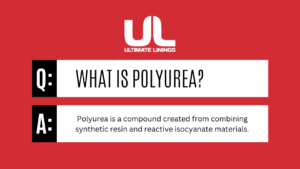
What Is Polyurea?
Polyurea is a compound created from combining synthetic resin and reactive isocyanate materials. Changing the kind of resins and isocyanates used can produce a variety of different qualities in the compound. The result of this process is a durable, flexible compound that is capable of preventing corrosion, resisting wear and tear over long periods of time, impact damage, and waterproofing for most coating jobs.
Between resistance to chemical damage, abrasion, harsh impacts, and temperature variations, polyurea is one of the strongest coatings you can use. Its versatility doesn’t stop at what it does, either. Polyurea can be applied to a wide variety of surfaces some of which include metals, concrete, plastic, and wood.
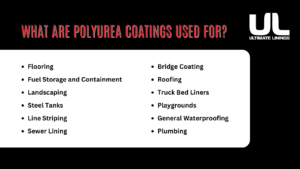
What Are Polyurea Coatings Used For?
The versatility of polyurea coatings can’t be overstated. When properly prepared and applied, polyurea can be used for a variety of coating tasks. Some of these applications include:
- Flooring
- Fuel Storage and Containment
- Landscaping
- Steel Tanks
- Line Striping
- Sewer Lining
- Plumbing
- Bridge Coating
- Roofing
- Truck Bed Liners
- Playgrounds
- General Waterproofing
Polyurea has so many coating uses, the only limit will end up being what you’re willing to use it for.
What is Polyurea Grease?
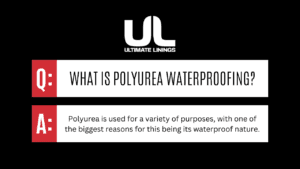
Polyurea grease is a synthetic extreme pressure grease designed to offer lubrication to appliances and equipment that experience long periods of demanding service, such as electric motors and rolling mill bearings. It helps these machines run cooler and more smoothly, and increase their efficiency and lifespan.
What is Polyurea Waterproofing?
Polyurea is used for a variety of purposes, with one of the biggest reasons for this being its waterproof nature. This makes polyurea a perfect coating for roofs, pools, water tanks, kitchen floors, plumbing, and any place where water damage is a factor.
Can I Paint Polyurea?
You are more than able to paint on polyurea once it’s applied, though there are risks of the paint cracking over time. The best paints for polyurea will be oil based and acrylic latex house paint.
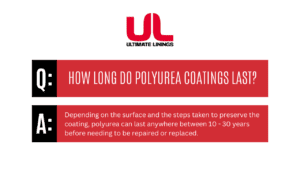
How Long Do Polyurea Coatings Last?
Polyurea is created specifically to be as durable as possible without sacrificing flexibility or smoothness on the surfaces it coats. Depending on the surface and the steps taken to preserve the coating, polyurea can last anywhere between 10 – 30 years before needing to be repaired or replaced. This number will change depending on, again, what the polyurea is coating, as well as the general conditions it sees over time.
Places that see a lot of traffic or use will have to be taken care of more than low traffic, low stress ones. Still, all this means is that these places will need a close eye on them over time to make sure the polyurea is able to do the best job it can for as long as it can. If you maintain your coating effectively, it’s entirely possible for it to last over 30 years.
How Are Polyurea Coatings Applied?
Applying polyurea coatings is a delicate and fast process. You will want to make sure that the surface you are applying it to is clean and ready for the coat, so as to ensure the coat doesn’t set incorrectly. After that, a high pressure spraying system will be used to apply the polyurea coating. These can be robotic spraying rigs, mobile spraying trucks, and even handheld cartridge guns.
It’s important to make sure that you are applying it correctly, the way you want it and exactly where you want it, as polyurea coating sets very quickly. If any mistakes are made, they have to be identified quickly, or a full redo of the application may be required.
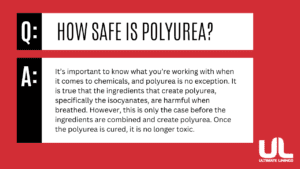
How Safe is Polyurea?
It’s important to know what you’re working with when it comes to chemicals, and polyurea is no exception. It is true that the ingredients that create polyurea, specifically the isocyanates, are harmful when breathed. However, this is only the case before the ingredients are combined and create polyurea. Once the polyurea is cured, it is no longer toxic. This doesn’t change the fact that protective equipment like face masks are necessary when applying polyurea, but this process must be completed by trained professionals anyway.
In terms of flammability, while it is possible to burn polyurea with high heat, it is not a flammable compound once applied and set. Additionally, it is also possible to create polyurea coatings that are specifically designed to be flame retardant beyond the coating’s natural resistance to extreme temperatures.
Conclusion
Hopefully, this article has helped you understand polyurea a little bit more. If you’ve decided that polyurea is the coating choice for you, contact us so we can get started working with you on your next project.
